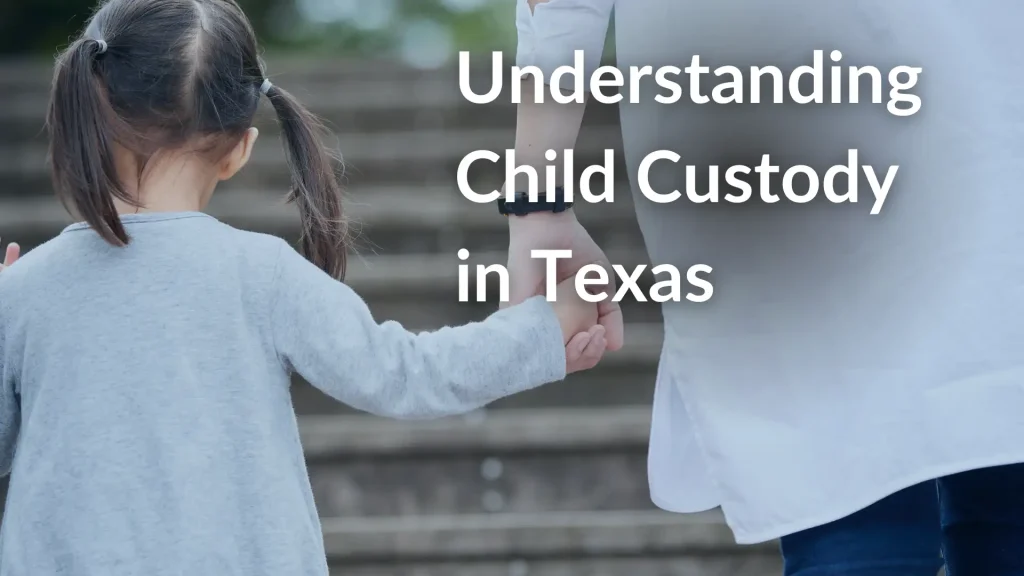
When parents separate or divorce in Texas, one of the most important and emotional topics is child custody. You’re not just figuring out where your child will live. You’re also deciding who decides about their health, schooling, and daily life. Texas child custody laws can feel overwhelming at first, especially if you’re already going through a tough time. It is essential to understand your rights during this time, especially since Texas child custody laws can directly impact your role in your child’s life and future. You can get more tips on how to win child custody.
Overview of Child Custody Laws in Texas
You won’t often hear the word “custody” in Texas in legal paperwork. Instead, the law uses the term “conservatorship.” A conservator is a person who has rights and duties related to a child. There are different types of conservators, but every decision made by the court is meant to support the child’s best interests in child custody & visitation matters and agreements.
Types of Conservatorship in Texas
There are several types of conservatorships in Texas. These include:
- Joint Managing Conservator – In most cases, courts prefer this arrangement. Both parents share the responsibility of making major decisions for the child. The court typically designates one parent as the primary residence.
- Sole Managing Conservator – If one parent has a history of abuse, neglect, or serious conflict, the court may grant full rights to one parent. This parent can make decisions without the other parent’s input.
- Possessory Conservator – This is usually the parent who doesn’t have decision-making power but still gets time with the child. Their rights are more limited than a managing conservator’s.
Each type of conservatorship affects how parents make decisions regarding schooling, healthcare, and other important matters.
How Custody Is Decided in Texas
Texas judges always consider what’s best for the child. This includes things like:
- Each parent’s involvement in the child’s life
- The home environment
- The child’s emotional and physical needs
- Any history of abuse or neglect
The court may also consider the child’s wishes, especially if the child is at least 12 years old. While the child doesn’t make the final call, their voice does matter. If parents reach a child custody agreement, Texas courts often approve it if it supports the child’s well-being.
Please read more about a separation agreement here: What You Need to Know About Your Separation Agreement.
Visitation and Possession Schedules
Several types of visitation schedules are available. These include:
- Texas Standard Possession Order (SPO) – This default schedule works well for many families. It usually includes weekends, holidays, and extended summer time with the non-primary parent.
- Custom or Modified Orders – Sometimes families need something different, like a split-week schedule or shared holidays. Courts allow flexibility as long as it works for the child.
- Supervised Visitation Texas – If one parent poses a risk, visits may happen under supervision. This can occur at a court-approved facility or with a neutral third party.
Texas courts expect both parents to follow the plan closely. That’s where child visitation rights in Texas come into play. They are clearly defined to reduce conflict.
Modifying an Existing Custody Order
Life changes. Parents move, switch jobs, or experience health issues. If a significant change happens, you can request a new plan. To modify custody in Texas, you must prove that a material change has occurred since the last order and that the new arrangement would benefit the child. There are parenting plan requirements and paperwork that must be filed. Courts will review everything carefully, so it helps to work with the right family lawyer during this process.
What Happens If One Parent Violates a Custody Order

When one parent doesn’t follow the schedule, like skipping visits or keeping the child too long, it creates serious stress. However, you’re not powerless. Some things you should do include:
- Keep detailed records of each issue
- Try to resolve the problem peacefully if it is safe
- If it continues, you can ask the court to enforce the custody order
Texas courts can order make-up time and fines or modify the original agreement to fix ongoing problems. If you’re dealing with enforcing custody orders, the sooner you act, the better.
Other Custody Situations
Custody in Texas can vary based on your situation. Unmarried fathers must establish paternity to gain rights. Some parents request a 50/50 time split, which courts may allow if both homes are stable. Non-custodial parents still have rights to time and information. Grandparents can seek visitation in limited cases. Physical custody means where the child lives; legal custody covers decision-making.
Courts can divide these roles. Child support is usually paid by the non-primary parent and is separate from visitation. If parents can’t agree, a Texas custody hearing lets a judge decide what’s best for the child, and may also address financial matters like whether child support is a write-off in certain situations.
Speak With a Texas Child Custody Attorney Today
You don’t have to figure all of this out alone. Whether you’re facing a tough breakup, planning a new parenting schedule, or dealing with a parent not following court orders, our team of Texas child custody attorneys at Higdon, Hardy & Zuflacht, L.L.P. is here for you. We’ll help you understand your rights and build a plan that puts your child first. Call us at (210) 349-9933 today for a confidential consultation.


